Table of Contents:
Irene Käosaar: 2021 was the year of looking in the mirror
Registration for the free Estonian language courses will start on February 2nd
The Estonian Language Houses in Narva and Tallinn invite you to practice the language
We are looking for voluntary mentors to help Estonian language learners
The Estonian Language House in Tallinn celebrated its birthday and opened a Facebook page
The ‘Discover Culture in Your Own Language’ campaign is currently ongoing
Open calls for tenders and calls for proposals
Irene Käosaar: 2021 was the year of looking in the mirror
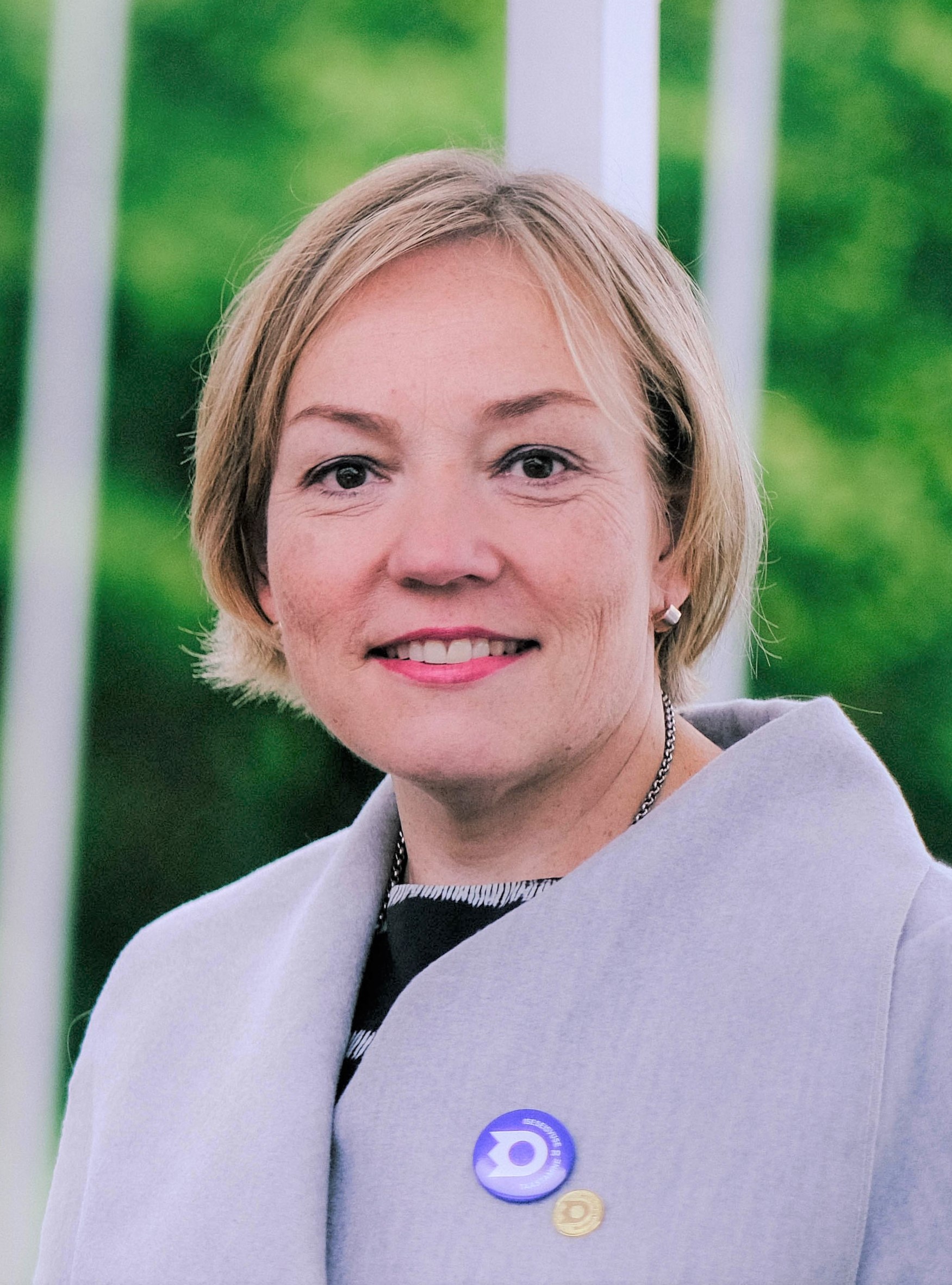 We have successfully made it to 2022. The beginning of the year is the best time to look back and think about the future.
We have successfully made it to 2022. The beginning of the year is the best time to look back and think about the future.
In 2021, the Republic of Estonia celebrated its 30th anniversary of restored independence. We looked back at these 30 years both at our international conference in November and at the singing party held in Narva on 20 August. It was a festive and important year, but also a year of introspection.
We have been constantly changing and developing since 2018. In 2017, the government decided to establish Estonian Language Houses in Tallinn and Narva. This important and challenging task was trusted to the Integration Foundation in 2018. In 2019, we moved to the head office of the Integration Foundation to Narva, and opened Estonian Language Houses in Narva and Tallinn. 2020 was the first year we were able to work in our own offices all year round. In addition, we had put together the best possible team and set the targets and we were ready to do whatever needed to be done.
Three years of hard work have borne fruit, and 2021 was a year of looking in the mirror for us – it was time for an interim assessment.
- In 2021, an integration monitoring report was published, the results of which are, on the one hand, an assessment of our work and, on the other hand, an indicator for the entire field of integration.
- We conducted a satisfaction survey among our partners – we received positive feedback for being a pioneer and centre of competence in the field and an open and caring organisation. Additionally, the relocation of the office to Narva was considered an important step by our partners in Ida-Viru County.
- We also conducted an internal satisfaction survey – we received confirmation that our employees are motivated and caring and associate their values with those in the field. The foundation has a collaborative and goal-oriented work culture.
- We conducted an impact analysis of the Estonian Language Houses – we received confirmation that people who participated in the activities of our language houses feel more confident in communicating in Estonian, have more contacts with people who speak Estonian as their mother tongue, and are more socially active.
These surveys reassured us that we were on the right track, but also helped us realise what else needs to be done to meet the expectations of our partners and the people who use our services.
In addition to the usual activities, in 2021, our tasks included leading the citizens’ agreement programme and expanding the scope of activities related to compatriots and returnees.
At the end of 2021, the new development plan for the field of integration Sidus Eesti 2030 (Coherent Estonia 2030) was approved. In addition to the guidelines of the new development plan, 2022 is the last year of funding for the current European Structural Funds, as well as the year for planning the new period. We will continue with all our activities and plan new ones that we can implement from 2023 onwards.
The coronavirus pandemic has highlighted the importance of online activities. A significant proportion of our language courses have taken place online. Our Language Friends Programme (Keelesõber) has brought together almost 500 pairs communicating in Estonian (more than 1,000 people in total), and more than 700 people have participated in the Language Roulette (Keelerulett). In addition to contact activities, we will definitely continue to offer some services online in 2022.
The web environment for adaptation and integration services LINDA, which was completed last year, was well received by all regions in 2021. We will continue to introduce it and keep the information there relevant. Our customer management programme was also completed at the end of last year, which will allow us to launch web-based self-service this year.
In 2022, we will celebrate the fourth birthday of Estonian Language Houses with the expansion into new areas – close co-operation with Lüganuse and Lääne-Harju rural municipalities is ahead. In addition to our old friends from Jõhvi, Kohtla-Järve, Sillamäe, Tartu, and Pärnu, we have found good partners in Maardu and Valga.
Finally, in 2022, we will focus on libraries. We are even more actively involving libraries in our work and partnering with libraries in their initiatives. Our partners and friends from libraries in different regions have embraced the themes of integration and are contributing in any way they can.
Happy 2022 to everyone – make time for yourself and read at least one book every month (it can even be a thin poetry book) – and the world will be clearer and brighter again!
Registration for the free Estonian language courses will start on February 2nd
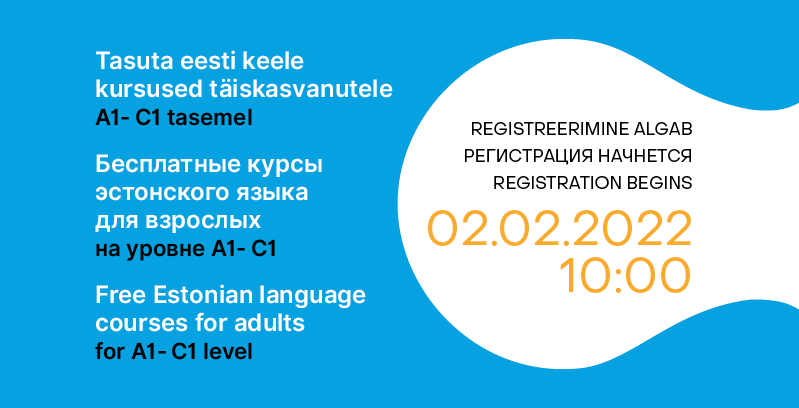
On February 2nd at 10 a.m., registration for the free Estonian language courses will start on the website of the Integration Foundation. Registration is open to adults from the age of 18 using their ID card, Mobile ID or Smart ID.
For those interested in the Estonian language, the Integration Foundation offers 160 places in A1–C1 level online courses and 784 places in A1–C1 level contact language courses in classrooms. Contact language language take place in Tallinn, Tartu, Pärnu, Maardu, Narva, Jõhvi, Kohtla-Järve, and the Ahtme city district. A total of 944 people can apply through public registration.
You can get acquainted with the course schedule and the rules for registering for courses, as well as test your language skills, on the website of the Integration Foundation. A COVID certificate is required to participate in contact language courses.
In addition to the A1–C1 level language courses, the Integration Foundation offers the opportunity to participate in events supporting language learning in the Estonian Language Houses in Tallinn and Narva (integratsioon.ee/kalender) and special language proficiency courses in the first half of the year.
We also recommend participating in the counselling sessions at the Estonian Language Houses of the Integration Foundation, where we analyse the needs and experiences of each person, determine their language proficiency level, and prepare a language learning plan. To register for counselling, please contact us by email at info@integratsiooniinfo.ee or call 800 9999 (free of charge).
The Estonian Language Houses in Narva and Tallinn invite you to practice the language
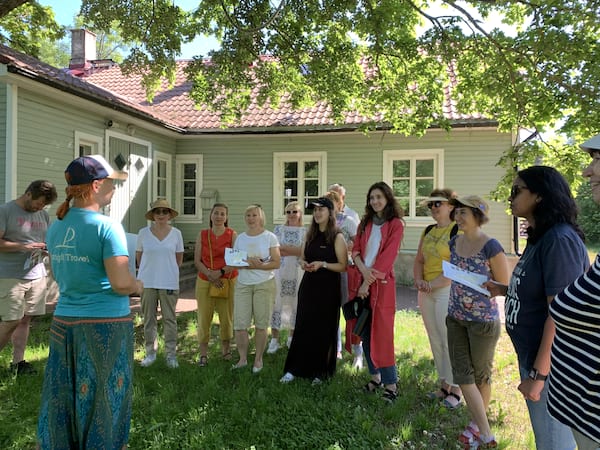
The Estonian Language Houses in Narva and Tallinn have launched exciting activities which support the learning of the Estonian language and provide an opportunity to get acquainted with Estonian culture.
The Estonian Language House in Narva, for example, continues the tradition of film nights and the social club of parents. The new series of language trips takes Estonian language learners interested in travel on nature hikes in Ida-Viru County. A floristics workshop is now offered in Jõhvi and the meetings of the Museum Day will continue. In spring, there will be a scooter trip and a visit to Tagavälja Farm. In Kohtla-Järve, Estonian is practiced on game nights.
The multilingual tandem choir has started its season at the Estonian Language House in Narva. There are still some spots (for men) available in the choir. The new pilot project Estonskad is aimed at upper secondary school students in honing their communication skills in Estonian in an open and developing environment.
The Language House in Tallinn will continue to organise calligraphy workshops, the Forest Game, visits to the Estonian Art Museum, the Culinary Club, and culture-focused study visits in Tallinn. In addition, language learners will be introduced to the history of Estonian maritime, visit the E. Vilde and A. H. Tammsaare House Museum, meet with contemporary Estonian writers, and take trips to the islands when the days get warmer. Language learners in the Pärnu region can take part in the social club in both Sindi and Pärnu.
Several series of online activities have started or are about to take place, where people from all over Estonia or all over the world can practice Estonian, be it the Mokalaat talking-shop, Language Roulette, Cultural Meetings, or Playground. You can read more about all language training options that are already available or will soon be available in the calendar of events.
We are looking for voluntary mentors to help Estonian language learners
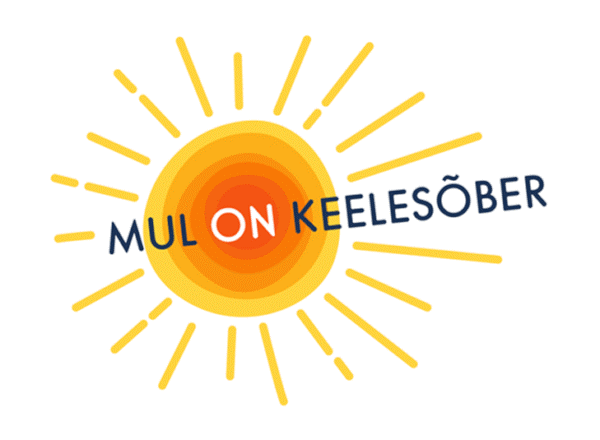
Integration Foundation is inviting people who speak Estonian as their mother tongue or other fluent Estonian-speakers to register as voluntary mentors to help Estonian language learners practice their spoken language by conversing with them via online channels or over the phone.
‘The purpose of the Language Friends programme ‘Keelesõber’ is to provide Estonian language learners further opportunities for practising communicating in Estonian and to encourage them to use the language on a daily basis. Within the two years after launching, the programme has brought together 1,837 language friends: 979 language learners have been able to hone their language skills with the help of 858 voluntary mentors. We are once again inviting volunteers to contribute to the programme – language learners are looking forward to the opportunity to talk to you in Estonian,’ said Ave Landrat, head of the Language Friends Programme of the Integration Foundation.
The foundation will start registering those interested in learning the language with the help of the Language Friends Programme on 10 February. Matching of the language friends will begin on Valentine’s Day, 14 February.
The Estonian Language House in Tallinn celebrated its birthday and opened a Facebook page with its own name
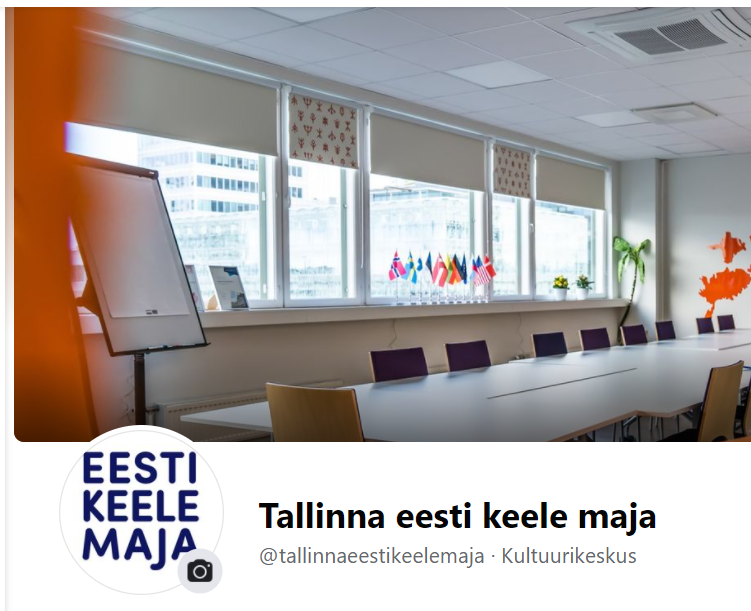
The Estonian Language House in Tallinn turned four years old in the middle of January. This important milestone was celebrated by inviting partners and opening the annual exhibition of the calligraphy workshop.
Hedvig Evert, Head of the Estonian Language House in Tallinn, ‘I was very happy to celebrate the birthday of the Tallinn House together with our language learners, teachers, partners, dancers, and colleagues from the Integration Foundation and the Ministry of Culture. This kind of a celebration reminds us of how important one conversation, one contact, one language lesson, or one casual meeting can be for new friendships, new challenges, and new cooperation plans. Somebody wrote in the guestbook of the Tallinn Estonian Language House, which was completed for our birthday, that having a lot of money does not make you rich; being curious and always being ready to learn something new does. To find out who the author of the idea was and what was the exact quote, come visit us! We are looking forward to seeing you here!’
In order for Facebook users to have a better overview of the activities of our language houses in different regions of Estonia, a new Facebook page Facebook.com/tallinnaeestikeelemaja was opened for the birthday of the Estonian Language House in Tallinn.
The new page provides information about the language learning and practice opportunities offered in Tallinn, Harju County, and Pärnu County. We will introduce what is happening in Narva and Ida-Viru County on the page we currently use (facebook.com/eestikeelemaja) – this page will become the page of the Estonian Language House in Narva. Information on language-learning opportunities in all regions will be published on both pages.
The ‘Discover Culture in Your Own Language’ campaign is currently ongoing
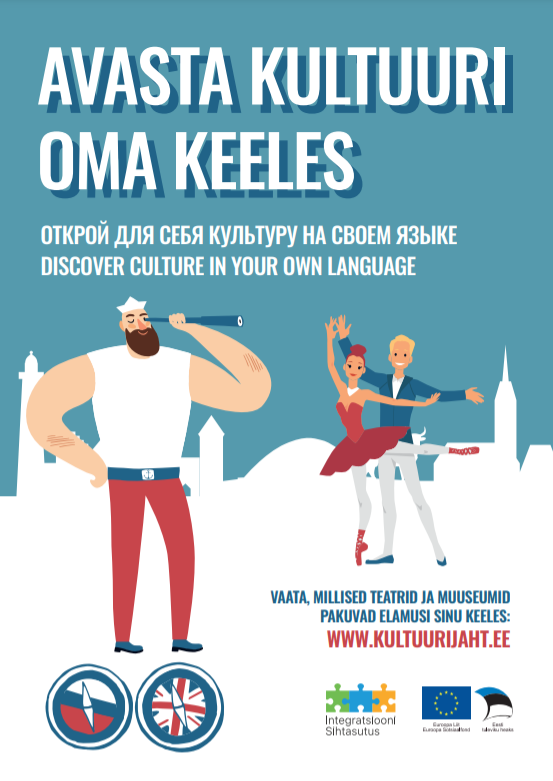
This campaign of the Integration Foundation highlights the fact that Estonian cultural institutions offer their content translated into various different languages via simultaneous interpretation as well as translated exhibitions.
Adverts in Russian and English can be seen on TV and heard on the radio and are also visible on social media and on the streets. The singer Elina Nechayeva is the voice and face of the campaign. Anyone can take part in the campaign on the kultuurijaht.ee website until the end of February where information can be found about the translated content of cultural institutions and an exciting prize game can be participated in to test one’s skills.
The campaign involves fifteen museums and performing arts institutions which were supported in 2016–2020 in the course of the European Social Fund’s ‘The criteria for granting aid for activities which support integration in the Estonian society’ project in acquiring technical translation solutions.
It will soon be possible to register for the services of the Integration Foundation in the self-service environment
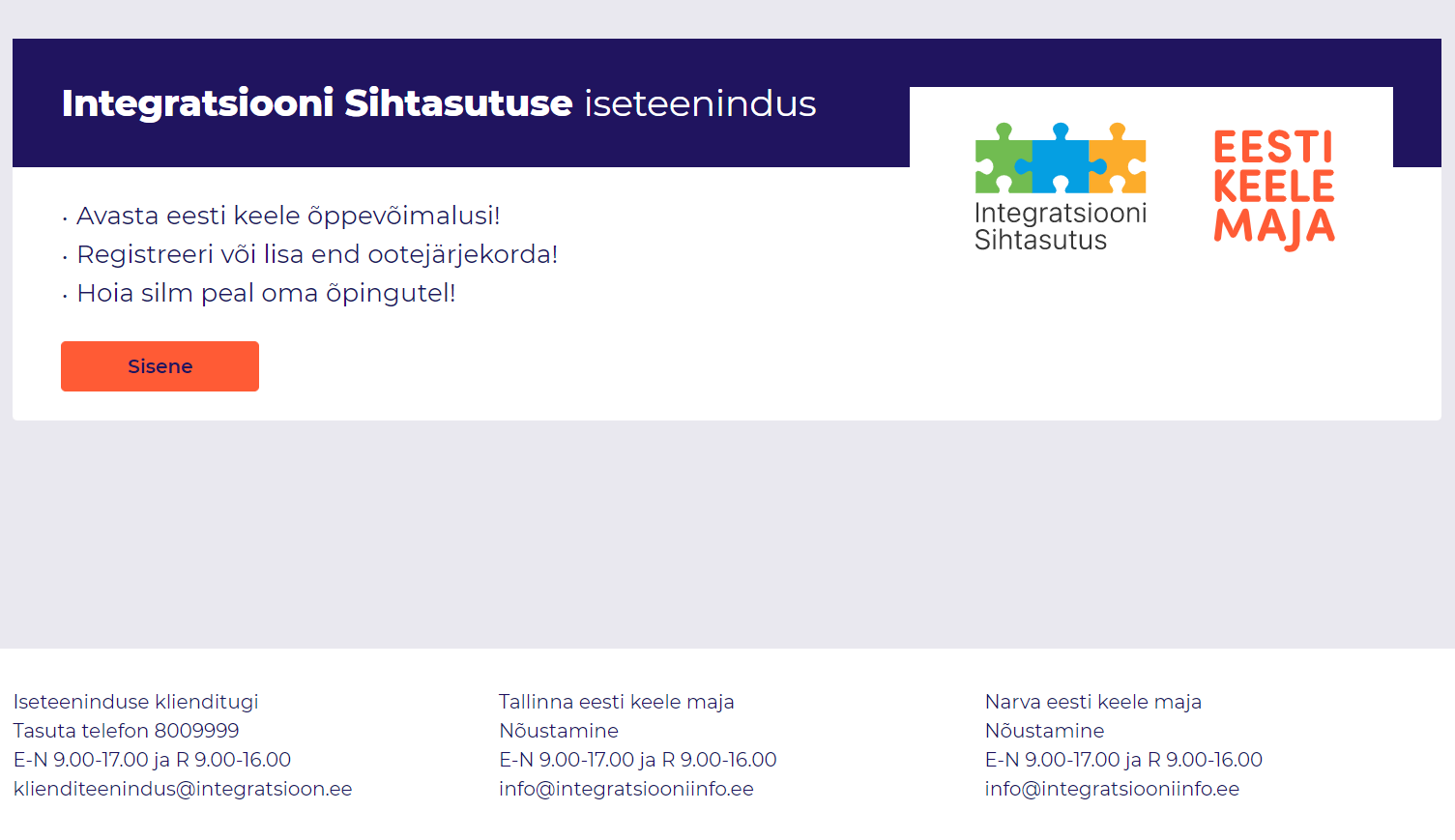
The self-service of the Integration Foundation is being completed, which will create a convenient opportunity for customers to register for various Estonian language courses and language practice events online.
Through this environment, all customers of the foundation can see the services and activities offered, make choices based on their language level, region, or interests, and register for the services and activities. Instead of separate registration links, a place will be created where customers can both register and view an overview of the services they have used and will use. In addition, other convenience features have been developed, such as offering personalised services or reminders of an upcoming event.
The services are already being entered into the self-service environment and we will announce the opening of the environment soon.
There are several ongoing public procurements and calls for proposals
We launched several public procurements and calls for proposals in the beginning of the year. Applications are welcome for the calls for proposals titled ‘Cultural and sports events which facilitate integration’, ‘Payment of return support’, ‘Operational support for family education partner organisations’, ‘Support for foreign Estonian cultural societies’, and ‘Support for the cultural societies of ethnic minorities’. A public procurement titled ‘Introduction of the Estonian cultural space to the permanent residents and new immigrants who have not been integrated to a great extent’ was announced recently.
Information on the announced calls is published on the Integration Foundation's website.
Our calendar
Information on events that take place by our organisation, participation or support, can be found in the calendar published on our website.
Our news
You can read the latest announcements of the Integration Foundation in the news section of our website and on the Facebook page of the Integration Foundation or the Estonian Language House.
